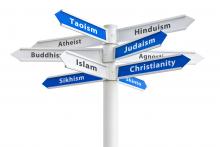Judaism
EARLIER THIS year, the Interfaith Partnership of metropolitan St. Louis held a public panel presentation addressing three Abrahamic religions—Judaism, Christianity, and Islam—on war and peace. Members of Interfaith Partnership and interested people from the community filled the chapel at Eden Theological Seminary to hear a Jewish scholar, a Muslim academic, and a Christian theologian (me) offer brief presentations on how our respective faith traditions value peace, as well as why, when, and how each religion views the use of violent force as sometimes morally justified.
During the question-and-answer period, I highlighted how in recent years both nonviolent and just war Christians have worked together on an approach, known as just peacemaking, for dealing with the underlying causes of war and thereby preventing its outbreak. As is often the case when I talk on this topic, most persons in the audience seemed unfamiliar with just peacemaking. After I attempted to clarify it further, someone asked the panel if other religious traditions had anything comparable to just peacemaking. The answer is yes, at least for Judaism and Islam, as shown in Interfaith Just Peacemaking, edited by Susan Brooks Thistlethwaite, a theologian and ordained minister in the United Church of Christ.
The 10 proactive practices that have been empirically proven as realistic and effective ways for preventing many wars form the framework for Interfaith Just Peacemaking. They were first identified in Just Peacemaking: The New Paradigm for the Ethics of Peace and War, edited by theological ethicist Glen H. Stassen. That book’s 23 contributors (scholars and practitioners from multiple disciplines—theology, political science, psychology, and history—and from pacifist and just-war perspectives) shared concerns about how just war has devoted insufficient attention to dealing with catalysts that lead to conflict (and not making war truly a last resort) and about how pacifism has failed to offer clear guidance about practical alternatives to war.
A court in Cologne, Germany, recently ruled that circumcising young boys represents grievous "bodily harm." The court found that the child’s "fundamental right to bodily integrity" was more important than the parents’ rights. According to the court, religious freedom "would not be unduly impaired" because the child could later decide whether to have the circumcision.
In response to the ruling, some Jews and Muslims who practice circumcision for religious reasons have protested vehemently. Subsequently, German politicians pledged to pass a law to protect ritual circumcision of young boys. Israeli Chief Rabbi Yona Metzger even traveled to Berlin to defend Jewish circumcisions, and a complaint against a Bavarian rabbi for performing circumcisions drew the anger of the Anti-Defamation League. The legal and cultural dilemma inherent in the issue makes prompt resolution unlikely.
Most of Germany (and the world) does not circumcise. It is instinctively viewed as harmful. Here's why...

JERUSALEM — Rabbi Yosef Elyashiv, considered by many the foremost rabbinic authority in the Jewish world, died in Jerusalem on Wednesday. He was 102.
Born in Lithuania, Elyashiv moved to Jerusalem with his family at the age of 14, where he was recognized as a budding Torah scholar.
Throughout his life Elyashiv wielded a huge influence not only among his fellow ultra-Orthodox Ashkenazi Jews but with many Sephardi Jews as well.
His rulings on every matter related to Jewish life, usually seen as extremely conservative, have shaped the way hundreds of thousands of haredim (as ultra-Orthodox Jews are often called) conduct their lives and run their communities.

It doesn’t seem seven years since Leonard Cohen’s last album because the man has spent the middle years of his 70s up to his wrinkles in a whole lot of activity including critically acclaimed concert tours that produced a plethora of CDs and DVDs and a No.1 hit single via the dubious conduit of X Factor winner Alexandra Burke!
The years between 2004's Dear Heather and his latest album Old Ideas have built Cohen’s status to a Zen guru presence. For weeks there has been anticipation about this new record not because the public is imagining some reinvention at the age of 77 but more that he is the closest thing rock music has to a spiritual sage and we are waiting for the wisdom he has to share.
Old Ideas is no disappointment for those looking for spiritual songs.

Andrew Bowen sat yoga-style in his armchair, absent-mindedly fingering a set of Muslim prayer beads in his left hand as he talked about 2011 -- his year of conversion.
But he's not Muslim. In fact, the 29-year-old Lumberton resident doesn't call himself by any of the 12 faiths he practiced for a month at a time last year.
Not Hindu (January). Not Baha'i (February). Not Zoroastrian (March). Not Jewish (April). Not Buddhist (May). Not agnostic (June). Not Mormon (July). Not Muslim (August). Not Sikh (September). Not Wiccan (October). Not Jain (November). And not Catholic (December).
Finding faith in God again was not Bowen's aim. This young father of two was looking for faith in humanity.

This is not another book that simply critiques religion. In Religion For Atheists: A Non-believer's Guide to the Uses of Religion, Alain de Botton, a noted author on a wide range of themes – from architecture to the works of Proust – examines those engaging and helpful aspects of religion (particularly focusing on Christianity, Judaism and Buddhism) that might, as he puts it, “fruitfully be applied to the problems of secular society.”
Anyone who might be offended by a work that from the outset (indeed on its very first page) asserts that “of course no religions are true in any God-given sense”, is encouraged to steer clear of this book by the author himself.
It is a book that seems to swing between revulsion of religion and the “religious colonization” that atheists are charged to reverse and a recognition that all is not well in the secular world, and that these ills may be somewhat righted by looking toward religion – let me clarify – toward those aspects of religious traditions that de Botton believes are relevant to the world today: community, kindness, education and art, for example.
The very first subject to be tackled is that of community – something that Sojourners knows a little something about (check out Nicole Higgins’ recent review of Wanderlust for some insights) – and what strikes me as interesting is that de Botton’s hypothesis on the loss of community mirrors a phrase often spoken by Sojourners CEO Jim Wallis:
Did we lose our sense of community when we began to privatize our faith?

A simmering interreligious controversy resurfaced recently with the news that the Church of Jesus Christ of Latter-day Saints had posthumously ``baptized'' a number of deceased Jews, including Daniel Pearl, Anne Frank, the parents of Nazi hunter Simon Wiesenthal, and evidently an unknown number of others.
The case of Mr. Pearl is particularly revealing, and holds important questions for Americans' ongoing experiment in religious pluralism.
Pearl, while on assignment for The Wall Street Journal, was beheaded in 2002 by a radical Pakistani group connected to al-Qaida. Moments before his death, he declared: ``My father is Jewish, my mother is Jewish, I am Jewish. My family follows Judaism.''

WASHINGTON — Debby Levitt's four children are dressing up big time for Purim, one of the more raucous of Jewish holidays, which begins on Wednesday (March 7) this year.
Commemorating Queen Esther's brave and successful efforts to save the Jews of Persia from extermination, Purim calls on Jews to rejoice in costume and to give goodies to neighbors and friends.
Girls often dress up as the beautiful queen, and boys as her valiant cousin Mordecai, who refused to bow down to the evil Haman, who aimed to extinguish all vestiges of Judaism from the kingdom.
The goody baskets — mishloach manot, in Hebrew, or the "sending of portions" — are meant to contradict Haman, who asserts in the biblical book of Esther that Jews were a people riven by strife.
Costumes? Goodies? Sounds like Halloween. But for the Levitts, it's nothing like Halloween.
I've been fascinated watching an earlier blog hunker down into a strong debate about Israel and the Palestinians (February 22, "
The issues surrounding immigration are politically complex and emotionally charged, especially at a time when many Americans are experiencing severe economic distress.
